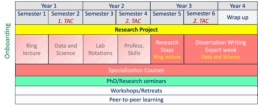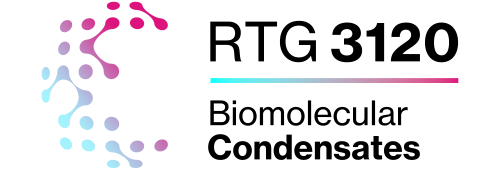Training and Supervision
The structured training program of RTG 3120 will enable PhD candidates to take interdisciplinary approaches in studying condensates, clearly communicate with scientists from other fields, and prepare for a stimulating scientific career. From onboarding and individualised research and training plans, to seminars, lab rotations, retreats, and thesis writing: RTG 3120 PIs will guide the students every step of the way and offer close supervision and mentoring. You can also consult the DFG website for PhD students that explains what a research training group is and what to expect.
A high degree of interdisciplinary knowledge is required in order to achieve breakthroughs in the field of biomolecular condensates including soft matter and polymer physics, biophysics, biochemistry, cell biology, and computational biology. While a high level of disciplinary excellence is necessary for the students to be successful in their respective fields, the interdisciplinary training will enable students to take immediate advantage of the progress in the other relevant research fields from understanding the reasoning and research strategies in these fields.
Leading experts in the field will present lectures and supervise seminars and lab-courses in the framework of a structured interdisciplinary teaching program ranging from theory to hands-on-training. We will also incorporate training on non-scientific skills and foster personal development towards successful careers in science, industry, and education.
The training and development of students is further complemented through close mentoring and structured supervision by experts from various disciplines to nurture interdisciplinary and collaboration.
Goals of the training program
- Achieve a high level of disciplinary qualification in the corresponding fields (theory/simulations, experimental biophysics, biochemistry, cell biology)
- Enable students to integrate insights and methods of other disciplines through communication to promote an understanding of their research culture
- Foster scientific and professional independence by giving students responsibilities for organizing seminars, retreats, and workshops
- Build a professional network through conferences and research stays
- Encourage students to plan their own research as well as guide master and bachelor students to develop transferable soft skills
- Ensure a mastery of managing research data according to the FAIR principles and ethical considerations.
- Acquire knowledge of tools and concepts of machine learning and artificial intelligence in science.
Program Elements

The German Term “SemesterWochenStunden” or SWS refers to hours per week in the lecture period of the semesters. for example, 2 SWS are 2 hours per week in the lecture period of the semesters. there are 2 Semesters in an academic year in Germany: Winter and Summer Semesters.
Onboarding will ensure a smooth start for students by equipping them with the knowledge and tools they need to kickstart their doctoral journey.
During the first weeks of starting, the students will be guided through completing the paperwork for the university and local authorities, establishing their work spaces, and preparing their individualized training and research plans. This phase will also include workshops on good scientific practice, basics of data management, using the electronic lab notebooks, and preparing the doctoral supervision agreement. The onboarding will be completed with a Kickstarter gathering where students introduce themselves and the thesis project they will lead and receive feedback from their colleagues. This will prepare the students for the initial Thesis Advisory Committee (TAC) meeting where their research and training plans are formalized.
The core qualification for each PhD student. The goal is to master the skills and qualification in the respective discipline, in addition to a developing interdisciplinary thinking and interdisciplinary collaborations. The projects will be supervised by experts in the discipline and co-supervised by PIs from complementary project areas.
Individual didactic lectures given by the participating group leaders and invited external speakers throughout the semester. Topics introduced cover basics in the respective fields of the lecturers and can go beyond the scope of biomolecular condensates.
A weekly lecture in the second semester introducing basic concepts including machine learning tools and introductions at on-site facilities to manage research data according to the FAIR principles and according to good scientific practice.
A full week will be blocked for an individualized Lab rotation in an experimental, theoretical, or simulation setting. Students will receive practical insights into complementary techniques without having prior experience in using these tools. The choice and number of rotations is determined during the onboarding phase and are incorporated into the individual training plan.
The specialization courses are taught throughout the PhD in a 2-year cycle. At least two are to be selected from a broad range of courses taught by the participating researchers and other lecturers at the TUD. In a mix of didactic lectures and interactive seminars, core knowledge and methods to study biomolecular condensates are taught from various disciplinary perspectives. The courses aim to provide deep and expert disciplinary knowledge, in addition to ensuring biologists and physicists can understand and can utilise the physical principles and the biological phenomena and functions, respectively. The courses are chosen during the onboarding phase and are incorporated into the individual training plan.
The Research and PhD Seminars alternate every week. RTG PIs and visiting scholars present in the research seminar the latest advancements in the field of condensates. At the PhD Seminar, students either present progress in their projects, give rehearsal talks for conferences, or hold Journal-club-style reviews of new developments in the field.
In cooperation with TU Dresden’s Graduate Academy, training will be offered with respect to planning and project management, scientific writing and publishing, presentation skills, fellowship writing, and leadership.
